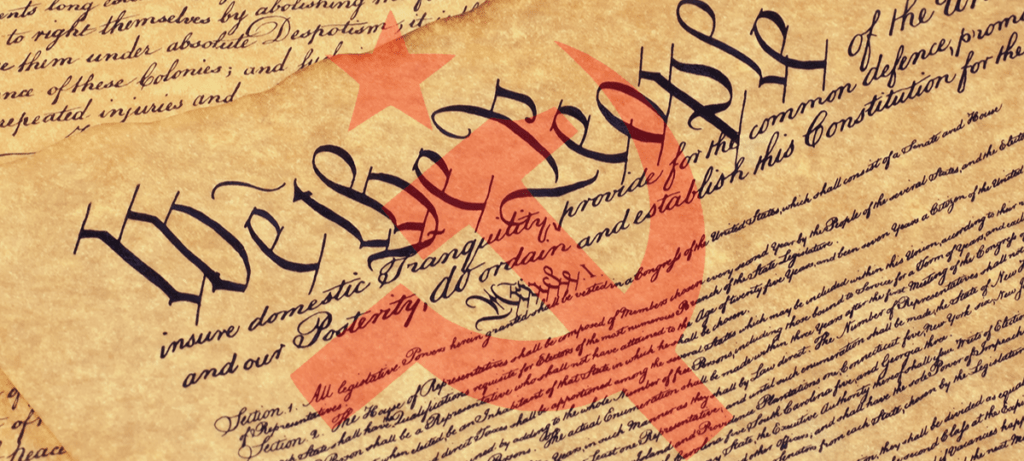Socialism, a political/economic theory advocating government ownership or regulation of the means production, distribution and exchange.
Citizens reject socialism, but with the coronavirus crisis, they increasingly support universal health care (45%-41%) and are now almost split on providing citizens a basic level of income support (40%- 43%). Both political parties spend and regulate as if socialists. Big corporations lobby hard for bailouts to socialize losses and manipulate implementing regulations to limit competition.
Gallup polls finds 43% of Americans view “some form” of socialism acceptable. While there is growing acceptance of socialist’s policies, there is the question – Is Socialism acceptable under the U.S. Constitution?
Broad, Vague, Massive Federal Powers
Other than individual liberties protected by the Bill of Rights, the Civil War Amendments (XIII, XIV, XV) and voting rights amendments, the U.S. Constitution grants wide-ranging powers to the federal government over the economy.
The Constitution grants the federal government power to create money, lay and collect taxes, borrow and spend money, regulate commerce, declare war and support armies, call forth the militia to execute the laws of the union and make all laws necessary and proper for carrying into execution all powers vested in government by the Constitution.
There is not a word requiring government to foster free enterprise, capitalism or any type of economic system. Yes, the Fifth Amendment of the Constitution provides we cannot be deprived of property without due process of law, nor can private property be taken without just compensation.
Due process is mostly a procedural right.
Just compensation means, if the government wants your property, you must take what the government offers unless you have more money than government to litigate over the value of it.
The federal government can tax us as much as it needs to satisfy its wants. From 1932 to 1981, the marginal tax rate in the U.S. ranged between 63% – 91%.
If the government incurs too much debt, it can manipulate interest rates. With low interest rates, government pays lenders little for the money it spends. High interest rates allow the government to devalue assets.
The Federal Government and its Citizens Promote Free Money
There is no constitutional limit on federal borrowing. The national debt is now $23.5 trillion and projected to run over a trillion-dollar annual deficit for the next ten years. Seventy-five percent of this deficit was incurred since 2001. That year our national debt was only $5.791 trillion. Clearly, borrowing, no matter the cost to future generations, is the preferred approach.
The Coronavirus Aid, Relief, and Economic Security Act, (“CARES Act”) Demonstrates Printing Money Is Government’s Answer to All Problems
To address the spread of the highly contagious coronavirus, federal and state governments imposed restrictive measures such as social distancing, travel restrictions, stay at-home orders and work closures. To relieve the personal economic hardships imposed by government regulation, the federal government passed a $2.2 trillion financial aid package, i.e. individuals receive extended unemployment payments, grants; big business was allocated $510 billion and the Federal Reserve can leverage these funds by a factor of ten. All monies are borrowed from future generations.
The President Has Massive Power to Regulate the Economy
Congress has given the president power to declare national emergencies under the Emergencies Act of 1976. Once the President declares a “national emergency”, government can control the activities of Americans, including internet communications, gatherings, domestic unrest, spying.
Under the Defense Production Act, the President, for national defense purposes, can force business into mandated production and supply activities; allocate materials and services; control the civilian economy, implement wage and price controls, and control credit.
These massive powers allow the president to control the national economy by claiming an emergency exists. The only question is what excuse justifies government economic control of the nation? To address coronavirus, Democrats already demand the administration to take over much more of the private economy.
Socialism Is a Big Business State of Mind
Certainly, big-business lobbies hard for corporate bailouts. From experience, Wall Street knows to “sell-off” until an acceptable bailout package is passed. Big-business has a long tract record for demanding and securing bailouts: Lockheed, 1971; Franklin National Bank, 1974; Chrysler, 1980; Continental Illinois Trust Company, 1984; the S&L crisis, 1989; the Airline industry 2001; Bear Sterns, Fannie Mae/Freddie Mac, AIG, 2008; Citigroup, and the entire financial industry in 2008; Auto industry, 2008; Bank of America, 2009 and today CARES.
A writer describes the federal allocation of capital to address the coronavirus as the “… largest step toward a centrally planned economy the U.S. has ever taken. And it socializes only losses. Profits, when they come, remain private.”
Government relishes having the power to control us. Big-business relishes cash from government socialism. Both get what they want and future generations get the bill.
What Is the State of Mind of Us?
Wall Street, corporations and citizens are recipients of the borrowed funds that comprise the national debt. CARES is just another financial aid package, although very needed. But there is always great need for financial aid; just never the money to pay for it.
Our Constitution allows us to organize as free marketeers, capitalists or socialists. We can have big government or small government. We can have a responsible government or a kakistocracy (rule by the least able or least principled citizens). Our Constitution gives us that choice.
As a country, if we recognize we have to pay for what we get, we have some tough choices to make.
However, if we continue passing the bills to our children, new, costly, government benefits are free to us. Every bailout makes it easier to give ourselves more “needed,” unpaid for, benefits. Next will be universal health care, a minimum income level, green mandates to save the planet, and more government manufacturing orders for our planned economy.
If we stay on the path of borrowing from future generations so we can spend today, we will soon realize that massive debt is actually the graveyard for our country.

